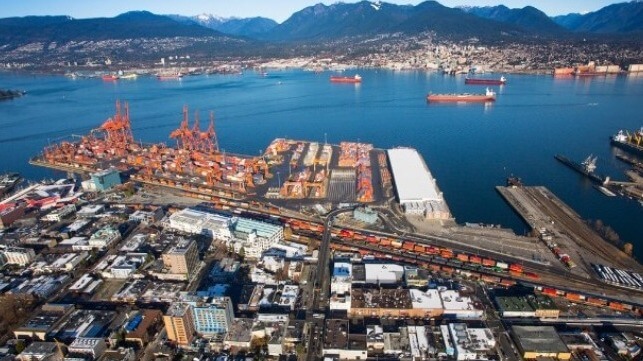ILWU Canada Schedules West Coast Port Strike Starting July 1

The ILWU Canada has served notice under the Canadian Labor Code that it plans to strike at the country’s West Coast ports starting on July 1 as the next step in its aggressive approach to contract negotiations. Even before the contract’s expiration on March 31, the ILWU Canada had moved to push the negotiations process forward saying, unlike its U.S. counterparts, it was not prepared to have the negotiations drag on for an extended period.
The strike notice came today, June 28, and under Canadian law requires three days' notice. As late as yesterday observers were hopeful of progress noting that the cooling-off period from the government-led mediation process expired on June 21. Negotiations continued but there are reports they hit a new impasse last night. Both sides however are saying they are still willing to meet with the next round of negotiations scheduled for tomorrow, Thursday, June 29.
The union has presented a long list of issues saying its goal is to protect jobs and its jurisdiction. They are also saying like many other unions they are seeking “recognition for the hard work and sacrifices that longshore workers made during the pandemic.” They are highlighting that workers were on the job during the lockdown period and kept Canada’s vital supply chains moving. Among the issues they are listing in addition to wage increases to address high inflation and skyrocketing cost of living, are automation and outsourcing.
“Their only objective is to take away rights and conditions from longshore workers after having gorged themselves on record profits during the pandemic,” said Rob Ashton, President of the ILWU Canada. He contends the British Columbia Maritime Employers Association (BCMEA) representing the employers is demanding major concessions.
“BCMEA has advanced multiple proposals and positions in good faith, with the objective of making progress and achieving a fair deal at the table,” they said in their statement. “Despite today’s regrettable development, we remain ready to re-engage with our labor partners through the federal mediation process.”
In addition, BMEA says it is open to any solution, including voluntarily entering a mediation-arbitration process shaped by the parties that, if necessary, provides for a binding outcome via interest arbitration. They contend that the ILWU Canada has so far declined the binding mediation and arbitration proposal.
“Unfortunately, the ILWU Canada Bargaining Committee has run out of options at the bargaining table because the BCMEA and their member employers have refused to negotiate on the main issues, and we feel we are left with no choice but to take the next step in the process,” said Ashton.
Under the Canadian labor code, grain vessels should not be impacted by the strike. In addition, BCEMA is saying it is their intention that cruise ships should continue to be serviced, meaning the strike would focus on containerships. The primary ports impacted would be Vancouver and Prince Rupert, which account for a significant portion of Canada’s foreign trade and are the gateway with Asia. BCMEA says the ILWU has not confirmed it will provide services during the strike to the cruise ships.

that matters most
Get the latest maritime news delivered to your inbox daily.
Responding to the news of the strike notification, Canada’s Federal Minister of Labour Seamus O’Regan and Minister of Transportation Omar Alghabra urged a return to the negotiations and working together to reach an agreement. The Federal Mediation and Conciliation Service also remains actively involved in the process and says it will keep supporting the negotiations until an agreement is reached.
The ILWU has been aggressive in its posture early on saying there was no progress in the talks and filing for the mediation process even before the expiration of the contract. The union represents 7,500 dock workers at the ports in British Columbia and at the beginning of June in a nearly unanimous vote members authorized a strike.
